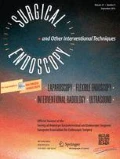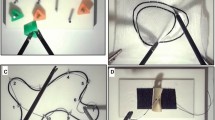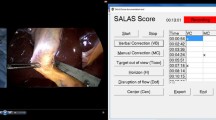Abstract
Background
Experts identified camera navigation and cannulation as important skills that are not assessed by the Fundamentals of Laparoscopic Surgery (FLS) hands-on examination. The purpose of this study was to create metrics for and evaluate the validity for two new tasks: camera navigation (N) and cannulation (C), and to explore the potential value of adding these tasks to the FLS program.
Methods
Participants were assessed by two raters during performance of N and C in addition to the five standard FLS tasks. They also completed a questionnaire regarding the educational value of the new tasks. Validity evidence was assessed by comparing performance between Novice (PGY 1 and 2) and Experienced (PGY 3 and higher) participants, and by correlating new task scores with standard FLS scores. The ability to predict level of training using scores was evaluated by regression analysis.
Results
Sixty subjects participated from five North American centers. Inter-rater reliabilities for both tasks were 0.99. Novice and Experienced participants scored 74 ± 17.8 versus 85 ± 8.3 (p < 0.01) and 21 ± 17.3 versus 39 ± 20.1 (p < 0.01) on N and C tasks, respectively. Correlations with total FLS scores for N and C were 0.39 and 0.53, respectively. Prediction of training level using the combination of all seven tasks was 52.6 % (R 2 = 0.526, p < 0.01), adding an additional 2.2 % to the five FLS tasks. Of 55 participants with laparoscopic experience, 51 % reported N to be similar in difficulty to reality. Of 28 participants who perform intraoperative cholangiograms, 43 % found C to be more difficult than reality. Most (70 %) participants thought the new tasks added value to FLS.
Conclusions
This study provides preliminary validity evidence for the metrics of these new tasks. The value of adding these tasks to the FLS manual skills assessment is marginal in terms of predicting level of training.


Similar content being viewed by others
References
Fried GM, Derossis AM, Bothwell J, Sigman HH (1999) Comparison of laparoscopic performance in vivo with performance measured in a laparoscopic simulator. Surg Endosc 13:1077–1081
Fraser SA, Klassen DR, Feldman LS, Ghitulescu GA, Stanbridge D, Fried GM (2003) Evaluating laparoscopic skills: setting the pass/fail score for the MISTELS system. Surg Endosc. doi:10.1007/s00464-002-8828-4
Fried GM, Feldman LS, Vassiliou MC, Fraser SA, Stanbridge D, Ghitulescu G, Andrew CG (2004) Proving the value of simulation in laparoscopic surgery. Ann Surg 240:518–525
Vassiliou MC, Ghitulescu GA, Feldman LS, Stanbridge D, Leffondré K, Sigman HH, Fried GM (2006) The MISTELS program to measure technical skill in laparoscopic surgery : evidence for reliability. Surg Endosc. doi:10.1007/s00464-005-3008-y
McCluney AL, Vassiliou MC, Kaneva PA, Cao J, Stanbridge DD, Feldman LS, Fried GM (2007) FLS simulator performance predicts intraoperative laparoscopic skill. Surg Endosc. doi:10.1007/s00464-007-9451-1
Ritter EM, Scott DJ (2007) Design of a proficiency-based skills training curriculum for the fundamentals of laparoscopic surgery. Surg Innov. doi:10.1177/1553350607302329
Korndorffer JR, Hayes DJ, Dunne JB, Sierra R, Touchard CL, Markert RJ, Scott DJ (2005) Development and transferability of a cost-effective laparoscopic camera navigation simulator. Surg Endosc. doi:10.1007/s00464-004-8901-2
Downing SM (2003) Validity: on meaningful interpretation of assessment data. Med Educ 37:830–837
Joint American Educational Research Association (1999) The standards for educational and psychological testing. American Educational Research Association, Washington
Fried GM (2008) FLS assessment of competency using simulated laparoscopic tasks. J Gastrointest Surg. doi:10.1007/s11605-007-0355-0
Acknowledgments
The authors would like to acknowledge Sarah Colon, Carla Bryant, and Inga Brissman from SAGES for their unrelenting support, phenomenal expertise, organizational, and administrative skills. In addition, we would also like to acknowledge Robin Hayward, Deborah Hogg, Tricia Foster, Anne M Quirk, Janet Adeletti, and all of the members of the FLS task force for their hard work and contributions. We would also like to thank psychometrician Kaaren Hoffman, PhD, of the University of Southern California, Division of Medical Education, Emerita status for her expertise in analyzing and interpreting the data. Finally, without the generosity of all of the participants, this study and this program would not have been possible.
Disclosures
Drs. Yusuke Watanabe, E. Matt Ritter, James R. Korndorffer Jr., Daniel J. Scott, Allan Okrainec, and Mary T. O’Donnell; Elif Bilgic and Pepa A. Kaneva have no conflicts of interest or financial ties to disclose. Dr. Liane S. Feldman is a consultant for Covidien and received an investigator-initiated research grant from Ethicon. Drs. Melina C. Vassiliou and Gerald M. Fried have received unrestricted educational grants from Covidien. Dr. Steven D. Schwaitzberg has served on advisory panels and has received an honorarium from Stryker and Olympus. He has served on advisory panels for Neatstitch and Surgiquest. He has also received a Grant from Ethicon.
Author information
Authors and Affiliations
Corresponding author
Rights and permissions
About this article
Cite this article
Watanabe, Y., Matt Ritter, E., Schwaitzberg, S.D. et al. Camera navigation and cannulation: validity evidence for new educational tasks to complement the Fundamentals of Laparoscopic Surgery Program. Surg Endosc 29, 552–557 (2015). https://doi.org/10.1007/s00464-014-3721-5
Received:
Accepted:
Published:
Issue Date:
DOI: https://doi.org/10.1007/s00464-014-3721-5




